Last Updated: August 17, 2022
Moving to Costa Rica with kids can be an exciting adventure. From the hidden beaches to exotic wildlife, Costa Rica definitely has a lot to offer families. We have been living in Costa Rica since 2013 and have a family of our own now. We can attest that Costa Rica is a wonderful place to raise children. But living here is not without its challenges. In this post, we’ll share some of the most important considerations about moving to Costa Rica with kids. We will cover basics like schools and where to live, and also some practical issues about medical care, vaccines, and shopping.
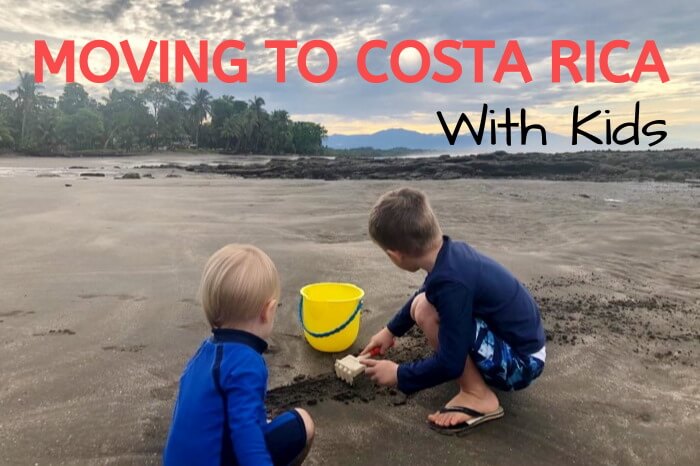
Background on Us
First Years in Costa Rica
When we moved to Costa Rica in 2013, it was just the two of us. We traveled all around the country house sitting and were able to pack up and go to another town whenever we wanted. We would spend two months on the beach in Guanacaste then cross the country to spend another month on the lush Caribbean coast. We lived with almost complete freedom and didn’t have to put much thought and planning into our decisions.
Now, with two kids, life taken us in a slightly different, albeit still awesome, direction. We’ve had to change some key things about our lifestyle. A big one is where we live.
After we finished traveling the country, we settled on a part of Costa Rica that we love, the rainforest-covered Southern Zone. We lived there for almost four years, about three of those with kids. We loved that time and did a ton of hiking and exploration.
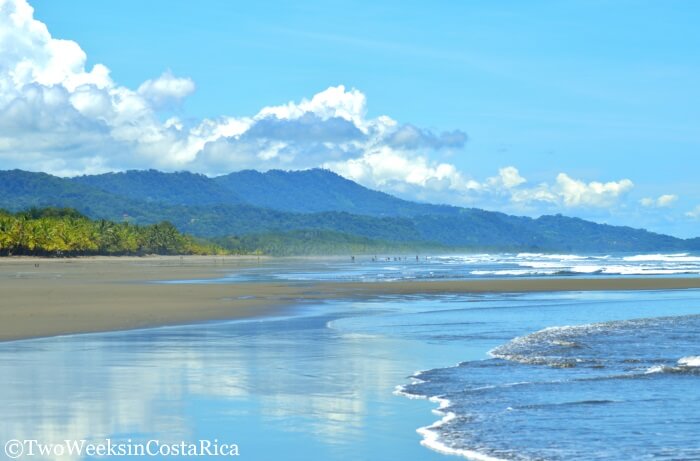
Over time, though, we realized that we were making life a little too hard for ourselves. This area is more remote and somewhat far from conveniences, which we really started to realize once we had kids.
The nearest big town, Uvita, is still fairly small so we would often drive 45 minutes or more to get to a bigger grocery store and for specialty items. We also found ourselves making the four-hour drive to San Jose for shopping and medical appointments. Another big factor was that we really needed better internet for work.
Moving to a More Developed Area
To be closer to San Jose and amenities, we found a great spot on the central Pacific coast near Jaco. We never would have pictured ourselves living near this more developed beach town before, but it has been perfect for us.
We’ve made other big changes over the last few years too, for schools, housing, and medical care. Below, we’ll touch on some of those so that you can keep them in mind as you plan your own move.
Income
One of the biggest considerations for anyone moving to Costa Rica with kids is how to support your family. Costa Rica isn’t cheap, especially with children, so you should have a solid plan in place. So how can you make a living while living abroad in Costa Rica?
Working Online
Many expats work online for companies in the United States or elsewhere. Some even just keep their remote jobs and continue on from here. You can find good cable or fiber optic Internet in many communities in Costa Rica so working online is a great option if you can do it.
Important Update: As of July 2022, Costa Rica has a digital nomad visa. This is a special visa category that lets you stay in the country for a year with the chance to renew for an additional year. Read our post, Costa Rica’s Digital Nomad Visa, for more information.
Starting a Business
For others, like us, they quit their old jobs and start something new. If you do this, it’s always a good idea to have some savings so that you have something to fall back on in case your plans don’t work out.
Many foreigners open businesses in Costa Rica. Probably the most common are those in the tourism industry. Hotels, restaurants, and tour companies are often owned by expats.
But the big catch with owning a business is that unless you have citizenship or permanent residency, which takes several years to obtain, your role is limited. Although you can own the company, you have to hire locals to perform the actual work.
Working for a Costa Rican Company
You also can’t work for a company in Costa Rica without residency. The government does this to protect jobs for locals. There are exceptions if the employer can get you a work visa (we’ve seen this with teachers), but this is rare.
So most people will need to work online or start a business once they arrive. Some businesses succeed, but we have seen many others fail. Having a business in Costa Rica can be a lot of work due to bureaucratic and other practical challenges. So be sure to do your research before investing all your time and money into a new venture.
For more information about starting a business in Costa Rica, read our separate post.
Where to Live
Schools
For people moving to Costa Rica with kids, one of the biggest considerations in deciding where to live is most likely schools.
Public Schools
You will find public schools in almost every town in Costa Rica, even one-room schoolhouses in far-off villages. Some expats choose to send their kids to public school for the cultural experience and to learn Spanish. We have friends who sent their young daughter to a public school in a small beach town for a few months before they ended up moving back to the United States, and they thought it was great for her.
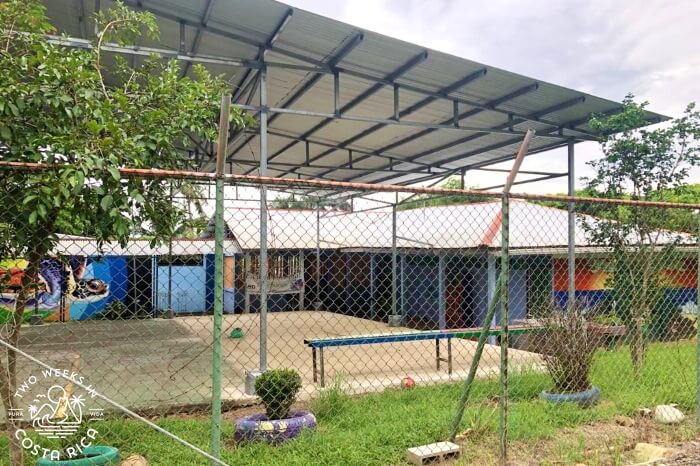
For our family, we have our sons in a private school and plan to continue with them there. We did this because we wanted them to have more time in the classroom and a more robust education. Public school schedules are typically for only a half day, so classroom hours are somewhat limited. Since we’ve been living in Costa Rica, we have also seen large gaps during countrywide strikes, where the kids were out of public school for months. These missed days were never made up.
Private Schools
Where Are They Located?
Private schools can be found all around the country, but are concentrated in the Central Valley near San Jose. There, you will find fully accredited, bilingual schools that have been around for decades. You can find good private schools elsewhere as well, but they are more spread out so you will need to do some research.
The Dominical/Uvita area has a few different options for good private schools, and many expat families live in this area. Manuel Antonio/Quepos has one option that we know of for private school. Jaco has two private schools and also a private religious school. Guanacaste has a couple of well-known private schools situated between some of the popular beach towns.
What to Expect?
Some private schools have a mix of Costa Rican and expat kids, which we prefer so that our kids have friends that “stick around.” Since foreigners often move back after a year or two, expat kids can come and go.
Schools differ on whether they teach primarily in Spanish or English. Private school teachers are a mix of local Ticos and North Americans or Europeans, so sometimes a class is predominately taught in English but there is a Spanish teacher. The reverse can be true as well.
At our son’s school, one grade is in Spanish, with an English teacher who comes every day to do an English lesson. Another grade at the same school is mostly in English with some Spanish. A lot of times it just depends on the teacher’s first language.
Schools vary in terms of the qualifications of teachers, so be sure to inquire. Also, facilities vary a lot. Some private schools are simple with just a couple of extras like a soccer field and playground, while others have a pool for swim lessons, robotics lab, computer lab, etc.
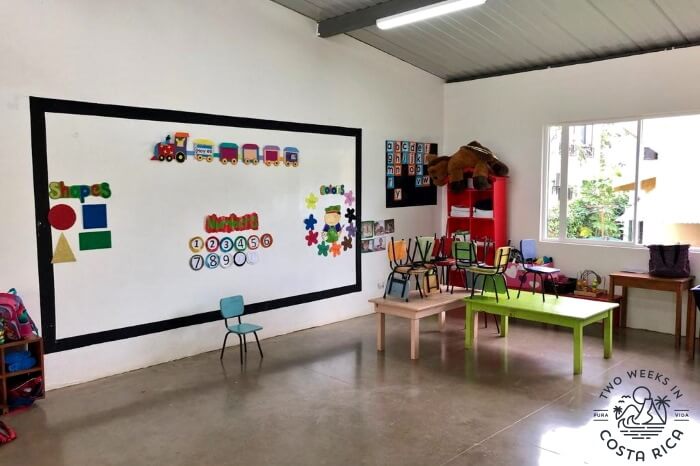
The cost for private schools range from around $300 up to $1,000 per month at the most prestigious institutions. Usually, there’s an annual matriculation fee, monthly fee, and additional costs for uniforms and books. Almost all schools, both private and public, require a uniform.
For more information on private school options in Costa Rica, we recommend joining the Facebook group called Families with Children in the Central Valley. This is focused on the San Jose area but has lots of members living in other locations.
Home Schooling
Home schooling is technically illegal in Costa Rica, but many expats do homeschool their kids.
Costa Rican law requires all Costa Rican children to be enrolled in either public or private school from preschool (starting at age 4) through primary school (6th grade; usually age 11-12). To the best of our knowledge, children who have residency in Costa Rica also are required to attend school, though in reality, this is not always the case.
Secondary school (high school) is optional but offered to any Costa Rican child/legal resident for free through the public system.
As a family moving to Costa Rica, your children obviously will not be Costa Rican citizens or considered residents until you file for residency and get approved. Therefore, you are not obligated to send them to a physical school in Costa Rica. Many expats live in Costa Rica on a tourist visa for many years (renewing it every 90 days) so this option works for them.
Proximity to Amenities
Although many people want to move to Costa Rica to simplify their life, which is great, we also recommend being practical. Being close to some amenities that will make life easier goes a long way, especially when transitioning into your new life.
Shopping
Clothing and Toys
Outside San Jose, finding a good pair of kid’s sneakers, a nice toy, and even decent quality clothes can be tough. Many people (us included) stock up when they travel or have family visit. We bring back full suitcases when we visit the States because it’s significantly cheaper and the quality is better.
We recommend bringing quite a few toys with you. Toys in Costa Rica are a lot more expensive. A 20-piece Lego set (brand name) can be upwards of $40-50, for example. Most small towns have stores that sell some items, but often they aren’t well made and still pricey. There are big toy stores in San Jose, though, and they do have sales if you get the timing right.
Groceries
In rural areas, you may have to drive 30 or more minutes to get to a larger grocery store. And then it still might not have everything you’re looking for.
Where we live near Jaco, we have several large grocery stores, including a good one that is Walmart-owned and has a lot of variety. We didn’t like Walmart when we lived in the States, but it’s a good option for grocery shopping in Costa Rica. There’s also an Automercado nearby, which is a high-end grocery store that has a lot of North American/European products. It’s harder to find nicer grocery stores like these in more rural towns.
For big box stores, you have to go to the Central Valley (around San Jose) or Liberia. PriceSmart is similar to Costco in the States. It has lots of bulk items that foreigners are typically looking for like good olive oil, cheese, cleaning products, etc. They also have a lot of kid items like granola bars and cereal. PriceSmart has several locations in the Central Valley and is opening a new store in Liberia as well.
A great thing for families moving to Costa Rica is the ample variety of fresh fruits and vegetables. Most communities have a vibrant farmers market where you can stock up on everything you need for a very reasonable price. Organic is getting a lot easier to find too.
Doctors and Dentists
Pediatricians
Most towns have private clinics with English-speaking doctors, but if you want a pediatrician, you will probably have to go to San Jose. This is one big reason that we moved closer to the city, especially with the birth of our second child. We have been using an office in Escazu with excellent English-speaking pediatricians and pediatric specialists for several years now. The office is very professional and we have been happy with the care.
Emergency Care
For emergencies, you can find private clinics or general practitioners who speak English in most areas. In larger towns like Quepos (near Manuel Antonio), Jaco, Tamarindo, Nosara, La Fortuna, and Monteverde, the clinics will be larger and offer more services.
The clinic near us in Jaco has some excellent English-speaking general family practitioners, and they bring in specialists for things like X-rays, ultrasounds, and dermatology on a regular basis. We have taken care of minor medical issues and even emergencies at our clinic a few times, and it has been a great local resource.
For more serious emergencies, public hospitals are located throughout the country. Here, you will find mostly Spanish-speaking doctors and nurses, though some do speak English. Public hospitals in Costa Rica are very simple with a lot of shared spaces among patients, which can be a shock to North Americans. The care is generally good, though it varies a lot by hospital.
Private hospitals in San Jose are a great option for any planned procedures. These are modern facilities with many more English-speaking doctors. Some of the most well-known are Hospital CIMA, Clinica Biblica, Hospital La Catolica, and Hospital Metropolitano. We have used CIMA several times, including for childbirth, and have had good experiences.
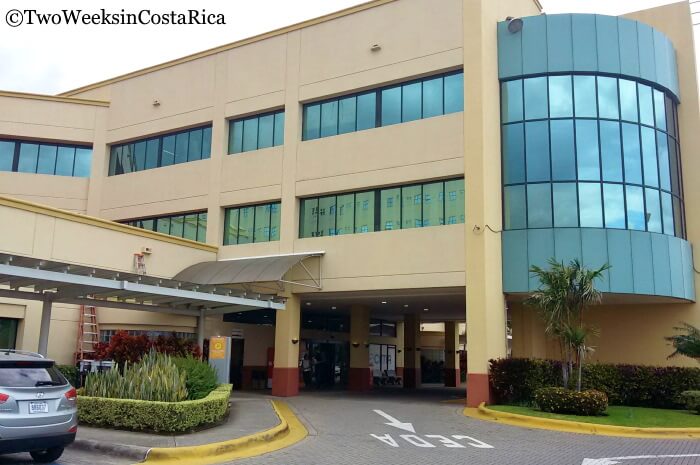
Dentists
For pediatric dentists, there are many options around San Jose.
Outside the city, a local clinic may have a pediatric dentist come from San Jose once or twice a month so it’s possible to be treated locally.
Kids’ Activities
Compared to where you will be coming from, things to do with kids will be less in some ways.
Although you will have more opportunities for outdoor activities like hiking, surfing, and the beach, actual kids’ play areas are harder to find. Some big towns have a playground, but usually there is only one. Indoor activity centers don’t really exist outside San Jose. Sometimes you’ll find a play area in a local restaurant, though, so ask around once you move.
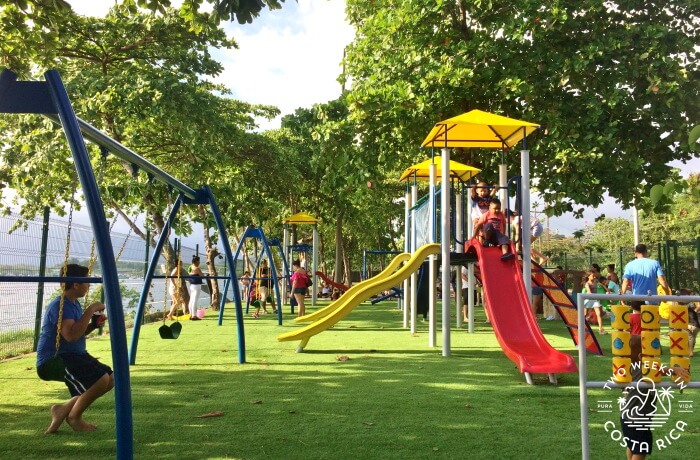
Adapting to New Life
Cultural Differences
Moving to a new country is a lot to handle for adults and can be for kids too, especially older ones. Culturally, everything will be different, from the food in restaurants to what you can find in the grocery store. Hopefully you will have taken some trips to Costa Rica already as a family to begin the acclimation process.
From home, there’s also a lot you can do to get the kids thinking about their new life. We have a Virtual Field Trip series aimed to get them excited about Costa Rica so be sure to check that out. We talk about sea-turtle nesting, volcanoes, how bananas and pineapples grow, and share books that they might be interested in as well as exploring other cool stuff.
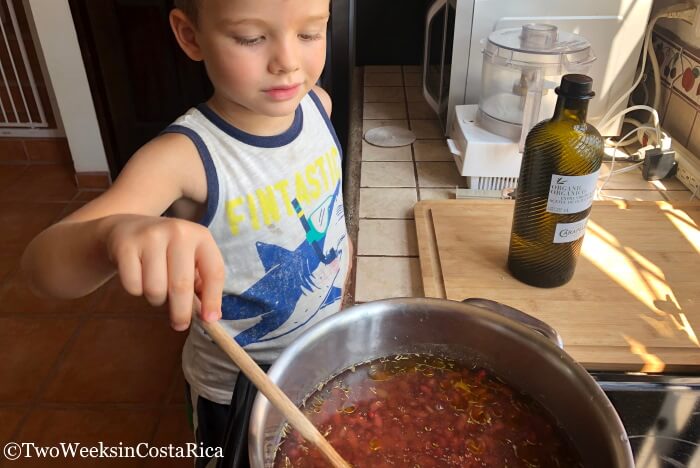
Different Activities/Sports
This can be an important point if you’re moving to Costa Rica with older kids. In most towns, you’ll find soccer, of course, but other team sports are harder to come by. We don’t know of anywhere that has teams for baseball, basketball, American football, lacrosse, volleyball, etc.
However, you can find things like karate, music lessons, swimming, and ballet/dance. Near Jaco, we have karate, painting class, and church youth groups. You also can periodically find robotics and theater/puppets, and sometimes local restaurants have family-friendly events.
We’ve seen families have to move back because their kids missed sports so much, so keep this in mind if you have a sports lover in your family.
Ease of Living
This one is for the moms and dads. It’s more work in many ways to live in Costa Rica because many things take more time. This is especially so when you are first moving and need to figure everything out. Paying a bill or doing a simple transaction at the bank can unexpectedly take a half day.
Also, there’s no Amazon Prime so things are not just a click away. As we talked about above, you may have to drive an hour and stop at three stores to find just what you’re looking for.
The good news, though, is that it’s a lot more affordable to have people help you. House cleaners and childcare is a fraction of the price compared to North America and most of Europe, so be sure to take advantage!
Coping with Missing Back Home
With these big changes, your kids are likely to miss their old life back home. This will probably happen in general and especially during large events like holidays and birthdays. They’ll miss their old friends and family.
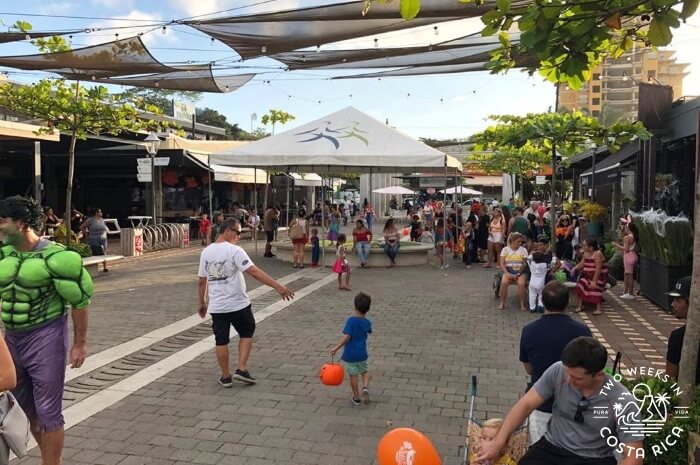
Our experience with this is different since our kids were born in Costa Rica, but we still go through it to some extent. One of the best ways to handle it is to plan visits to see these grandparents, cousins, and old friends.
For us, we fly Matt’s parents down every year and try to get back to the States once a year too, so that we see them every six months or so. If we can time the visit for one of the kids’ birthdays, even better.
Seeing family through video calls helps, but it’s no substitute. Make sure to also bring lots of photos so that you can fill in the gaps and relive some of those old memories.
Miscellaneous Practical Considerations
Visa Options and Border Runs
A practical consideration of moving to Costa Rica with kids is what to do about your visas.
The digital nomad visa we mention above is a great option for a short term stay if you work online.
Residency is another option, but since many expats move back in a year or two for one of many different reasons, we usually recommend that people wait a bit to apply. This is because residency is somewhat costly and a lot of work.
If you choose not to apply for the digital nomad visa or residency, you will enter the country on a regular tourist visa. Typically, tourist visas are 90 days, but it depends on your entry stamp. That means that every member of your family will need to leave the country every 90 or so days when their visa expires.
You can go to the border in Panama or Nicaragua or to any other country by plane to renew your tourist visa. If you just do a “border run,” that is go to the nearest land border for the purpose of being stamped in and out, there’s always a risk that you won’t get a 90-day visa.
Panama has been getting stricter with people who have been doing border runs. We’ve heard many stories recently of people who were given a lot less than 90 days.
So just keep in mind the visa-renewal process and how you would have to do it at least every 90 days.
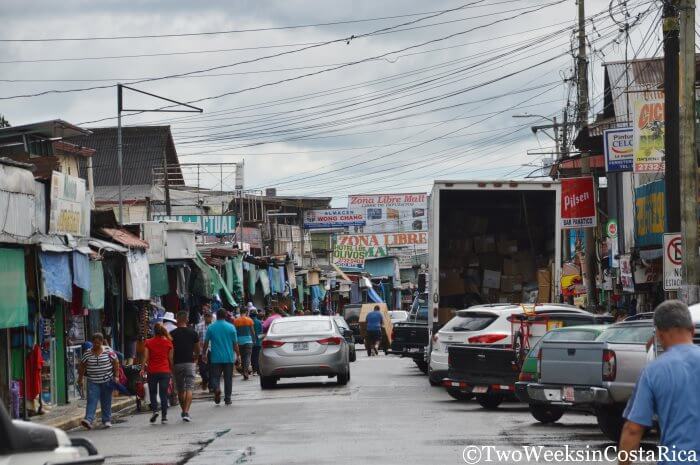
Additional Resources
Here are links to two of our posts on border crossings to give you an idea of what to expect:
Paso Canoas: Crossing Costa Rica and Panama’s Biggest Border
Crossing the Rio Sereno Border Between Costa Rica and Panama
Vaccines
One issue that sometimes comes up for people moving to Costa Rica with kids is vaccines. Costa Rica is very strict with its vaccine requirements. By law, all children must have them and there are no exceptions. You will need to show a vaccination record when you enroll your children in public or private school.
If you plan to have a baby here, vaccinations will be required shortly after birth as well. The schedule is similar to the United States with the addition of a couple of things. For example, they still do the tuberculosis vaccine. Vaccines are free for all children born in Costa Rica.
Final Thoughts
We hope this post gives you some insight into moving to Costa Rica with kids. A move abroad is a big undertaking for anyone and getting a whole family here can be even more challenging. But some careful thought and planning goes a long way towards making it a successful adjustment. Costa Rica is a definitely a wonderful place with kids so it’s every bit worth the effort to make it happen.
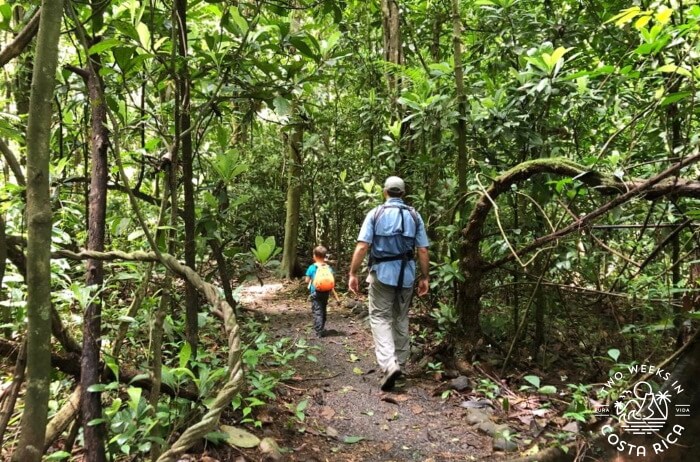
Video Chat Service
If you have questions about moving to Costa Rica with kids, we have a video chat service. We can help with basic questions as well as anything specific to your family. You can find more information and get in touch through our Video Chat Service page.
Last Updated: August 17, 2022
Have a question about moving to Costa Rica with kids? Ask us below.
Looking for more information on your move to Costa Rica? Check out these posts:
FAQs About Moving to Costa Rica: Learn more about the cost of living, house sitting, Internet reliability, buying a car, and how to get your stuff here.
Buying a Car in Costa Rica: Details our three car-buying experiences. One through a private sale, another from a rental car company, and the most recent purchase of a new car from a dealership.
Having a Baby in Costa Rica: Our four-part series on having a baby. Includes prenatal care, delivery, and how to get baby’s first passport and other documents.
Life in Costa Rica: Check out our whole Life in CR section for our periodic updates about living in Costa Rica and related articles.

